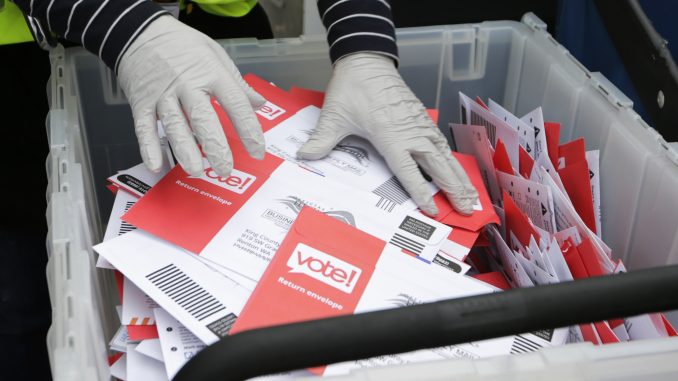
WASHINGTON, D.C. — President Donald Trump and Democrats are bickering over how to provide voters with safe and secure access to a ballot as the coronavirus pandemic rages in the U.S. and threatens to extend into the fall, affecting the general election.
With another economic rescue package in the works, House Speaker Nancy Pelosi, D-Calif, says she wants money to give more voters the chance to cast their ballot by mail.
In recent weeks, as Democrats nationwide have argued the country must prepare for voting largely by mail, Republicans have objected to or blocked expansions of such voting in Arizona, Georgia and Pennsylvania.
“It shouldn’t be mail-in voting. It should be you go to a booth and you proudly display yourself,” Trump told reporters Friday evening. Earlier this week on Fox News Channel’s “Fox & Friends,” he claimed the Democrats had a plan “that if you ever agreed to it, you’d never have a Republican elected in this country again.”
Health officials are warning that the virus has the potential to return with a second wave during the next flu season, putting voters and poll workers in a dilemma where fulfilling a civic duty means putting their health at greater risk.
Colorado, Hawaii, Oregon and Washington already provide registered voters with a ballot in the mail for all their elections, according to a Congressional Research Service report. California and Utah are among the states that give counties the option of mail-in voting.
Proponents say it can improve participation, particularly with voters who have to work on election day, go to school or have mobility issues, such as the elderly or the sick. It could reduce the number of poll workers needed, as well as the long lines that often arise during a presidential election.
“It just makes us more democratic,” Pelosi told reporters this week. “It just gives more people the opportunity to vote. So that is something we would like to see.”
Trump contends fraud would increase with more mail-in voting, declaring, “I think a lot of people cheat.”
Some Republican-led states have come to embrace the format, arguing it can be done securely and is cheaper and fairer than in-person elections. Utah, a GOP stronghold, is a recent convert to mail-in voting.
Evidence shows it is Republicans, rather than Democrats, who are most likely to vote by mail, said Michael McDonald, a University of Florida professor who tracks balloting.
State and local governments are responsible for determining whether or how to offer mail-in voting. A few bills introduced during the current session of Congress would require states to allow for early or mail-in voting for federal elections. Others would require states to allow mail-in voting during national emergencies and authorize the funds to help defray the costs.
The $2.2 trillion rescue package that Congress passed included $400 million for states to invest in the next election so they could expand early voting, move to mail-in voting, or increase safety measures at polling sites.
NSJ reported last month on a lawsuit, filed by Washington, D.C. attorney Marc Elias and left-leaning organizations, aiming to overturn laws passed by the General Assembly and signed by Gov. Roy Cooper in response to the Ninth Congressional District ballot-harvesting scandal. The law restricted who could apply and complete absentee ballot request forms and instituted criminal penalties for violating absentee ballot laws.
If that law is overturned, North Carolina elections could see usage of ballot harvesting measures such as those used in the 2018 election scandal as well as in states such as California.
A week later, N.C. Board of Elections executive director Karen Brinson Bell released a list of recommendations by a BOE task force in anticipation of expanded absentee by-mail usage. Among the task force recommendations are allowing voters to submit request forms by fax and email, establishing an online portal for request forms, and allowing a voter who did not include their driver license number or the last four digits of their Social Security number the option to include a copy of a current utility bill, bank statement, paycheck, or other government document showing their name and address.
Other changes recommended include making election day a state holiday, allowing care facility employees to help complete ballots, and eliminating a rule requiring a majority of pollworkers to reside in their designated precinct. The task force also recommends making those changes permanent. The General Assembly would have to pass legislation for any of those changes to occur.
“We believe the legislative recommendations released today would go a long way toward ensuring safe, accessible elections in 2020,” Bell said. “We look forward to continuing to work with the General Assembly to respond to the unprecedented threat facing our elections system at this time.”
The Associated Press contributed to this report.



